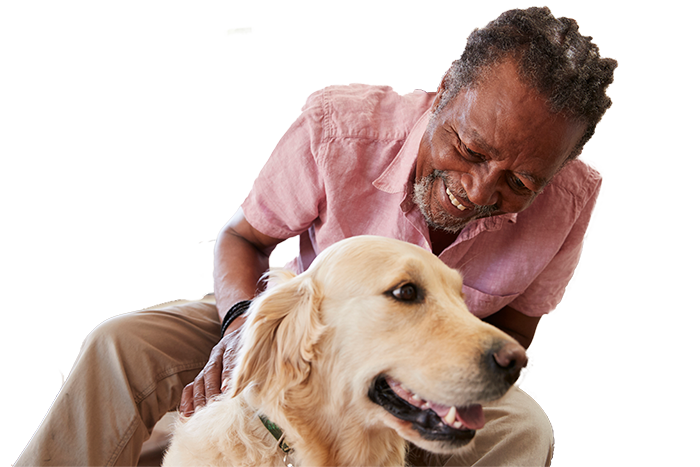An hour of your time can mean so much to others. If your dog is at least 12 months old and you have owned them for at least 9 months, have you considered joining PAT and becoming one of our valued volunteers?
To become a visiting volunteer with your dog, simply complete our online application form and provide two character references.
A copy of your pet’s vaccination certificates is also required.
An annual volunteer contribution is requested.
PAT Volunteer Teams are supported by the charity and we can introduce you to local establishments who have registered with us and are waiting for a visit. Regular visits are generally appreciated, but there’s no minimum or maximum commitment. It’s up to you how much time you dedicate to volunteering. All we ask is that your dog has regular breaks and doesn’t work for more than two hours at any time.
-
How do I apply to become a volunteer with my dog?
It's easy to apply to become a PAT Volunteer, simply click on the Apply to become a Volunteer button to complete the form. As part of the registration process, you will be asked to provide two character references for yourself and a copy of your pet’s vaccination certificate. All our PAT Pets are temperament assessed. A local accredited Pets As Therapy Assessor will check that your dog is sociable, friendly and calm.
For more information, please download our PAT Application Factsheet.
-
Are all dogs suitable to become a PAT Pet?
PAT Pets come in all shapes and sizes, and can be a pedigree or a crossbreed – though we can not accept dogs that are listed under the Dangerous Dogs Act 1991. PAT Pets should be friendly and calm, healthy and well-groomed, and love being fussed over. There are some requirements, however. Your dog must be at least twelve months old and you must have known them for at least nine months. They must also have up-to-date vaccinations, a regular worming treatment and be protected against fleas.
-
Is there an upper age limit for my dog to become a PAT Pet?
We know how much our PAT Pets give during visits; in the later stage of their life it may be too stressful to start this venture. If your pet is older, please consider the impact that visiting a new and demanding environment may have on your pet - it could exacerbate existing health conditions. We understand this may be a disappointment, but it is important to always prioritise the welfare of your dog.
-
Why is it a requirement that PAT Dogs don't eat raw food?
As a provider of therapeutic pet visits across the UK we always strive to ensure visits are carried out in the safest way possible and following all guidelines and recommendations. This includes guidance from the Intensive Care Society and guidance from the Royal College of Nursing which states visiting therapeutic pets cannot be fed a raw diet.
-
My dog was imported, can it be a PAT Dog?
Many imported dogs have become great PAT Dogs, however, if your dog was imported into the UK, your application will be put on hold as we will require some additional information from you.
-
I am a teacher, can I take my PAT Dog to school with me?
Unfortunately, due to insurance restrictions we are unable to support you if you wish to have your dog at your place of work. As a PAT Volunteer, your primary responsibility is to your dog and you are unable to do this if you are running a class or therapy session. If there was an emergency and the school had to be evacuated, as a volunteer you would be responsible for your dog, but as a teacher you are responsible for the children and therefore the welfare of either would be compromised.
-
What does the Temperament Assessment entail?
Your assessment will take place in a convenient location, where you’ll meet an accredited Pets As Therapy Assessor. The assessment is straightforward, lasts around 45 minutes and enables us to make sure your dog is friendly, sociable and calm, and that it doesn’t mind being stroked or handled. Fit, healthy dogs behave appropriately as PAT Dogs under demanding social and physical situations. A clean, well-groomed dog is a sign of a responsible pet owner. Assessors are also asked to make note of any other behaviours that they may observe throughout the assessment, for example, jumping up, pawing or excessive licking. Such behaviours are not acceptable on Pets As Therapy visits.
For more information, please download our Temperament Assessment Factsheet.
-
Can my assessment take place at my home address?
Unfortunately we are unable to carry out an assessment at your home address. It is important that the assessment is carried out at a neutral location for you and your pet so our Assessor is able to assess your pet outside of their own environment.
-
What if my pet fails the assessment?
If for any reason your pet does not meet our assessment requirements and there is considered to be an unacceptable risk to the clients/patients that we are visiting, your dog will be deferred. Assessors are trained to conduct the test in such a way that all pets are assessed fairly and consistently. The behaviours that may result in a deferral include jumping up, putting paws up or reluctance/backing away when being fussed.
Deferrals are discussed and considered very carefully and if your application is deferred, don’t worry, you’ll be invited to be re-assessed at a later date.
For more information, please download our Temperament Assessment Factsheet.
-
How much does it cost to become a volunteer?
Volunteers are required to pay an annual contribution to the Charity, which is currently £25 (or £35 for a joint contribution). This goes towards the volunteer’s liability insurance. Expenses may be reimbursed by some establishments, but please enquire about this before you start visiting.
-
Do I have to buy branded PAT Volunteer clothing?
You are not required to wear any official Pets As Therapy clothing, but you must always display your ID badge while on visits. If you are to appear in a publicity or National Office event, you and your pet may be asked to wear official clothing that has our Pets As Therapy logo on it. If this is the case, you’ll be able to borrow the items you require from our extensive loan stock. If, however, you’d prefer your own items, a full PAT Volunteer and PAT Pet range is available to buy.
-
How often am I expected to visit?
There is no set requirement on how often you need to undertake visits on behalf of Pets As Therapy, but regular visits are greatly appreciated by all those who receive them. Please discuss frequency with the establishment before starting your visits. For further information, please contact the Pets As Therapy National Office.
-
What can I expect from Pets As Therapy?
As a Pets As Therapy Volunteer you can expect: • Fair selection and recruitment • A rewarding and worthwhile volunteering experience that benefits individuals and the community • Support from local volunteers (Voluntary Area Coordinators) and from the Charity • Due diligence for your health and safety • The Charity to recognise the rights, roles and responsibilities of you and your PAT Pet.
For more information please download our PAT Volunteer Agreement Factsheet.
-
What does Pets As Therapy expect of its visiting volunteers?
As a PAT Volunteer the Charity expects you to: • Operate to the agreed standards and policies of the Charity and uphold the vision, aims and strategy of the Charity at all times • Work as an individual and also as part of a team • Abide by any requirements of the establishments you visit • Give the establishment notice of any absence or intention to stop visiting • Inform the Charity should you need to stop visiting • Take advantage of support and supervision offered and give feedback • Contact National Office for support and guidance if any problems arise.
-
Can I still visit if my dog has had a kennel cough vaccination?
If your dog has a live kennel cough vaccine, take advice from your vet as to how long to avoid contact with immunocompromised individuals. Also, please avoid visiting establishments if your dog is showing signs of kennel cough (coughing, sneezing, eye or nose discharge, etc) and stay away for three weeks after symptoms have been resolved.


